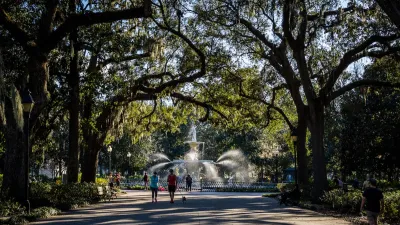What is the apt metaphor for a city? Machines? Insect colonies? In a new paper, physicist Luis Bettencourt says that if we look to the function of cities we find that they're essentially social reactors that obey universal mathematical parameters.
What is the best way to conceptualize a city, asks Emily Badger. "Bettencourt, in a paper published today in the journal Science, finally offers up an answer that borrows a bit from physics, economics, sociology, biology and a handful of other disparate reaches of science. We can never get the analogy quite right, he says, because cities are a thing that is found nowhere else in nature."
"At their most fundamental, cities are not really agglomerations of people; they’re agglomerations of connections between people," explains Bettencourt, a physicist with the Santa Fe Institute, in his paper. "All of their other properties – the roads we build to reach each other, the density required to do that, the economic products and ideas we create together – derive from this fact."
"Cities, Bettencourt has concluded, are a 'special kind of social reactor.' And, as such, they all evolve according to a small set of basic principles that can be used to predict the average social, spatial and infrastructure properties of any metropolitan place," says Badger. "Bettencourt’s theoretical framework suggests that a kind of optimal city exists when we have the most social interaction – and social and economic output coming from it – with the least cost of connecting people and goods and ideas to each other."
"The idea that cities are governed by some universal rules of math may make it sound like the urban planner has little control. But, in fact, Bettencourt sees the planner’s job to try to steer cities toward that optimal point (G*) on the above graph. Beyond that point, the number of social interactions in a city can still grow, but the cost of them rises faster than the benefit."
FULL STORY: Scientific Proof That Cities Are Like Nothing Else in Nature

Trump Administration Could Effectively End Housing Voucher Program
Federal officials are eyeing major cuts to the Section 8 program that helps millions of low-income households pay rent.

Planetizen Federal Action Tracker
A weekly monitor of how Trump’s orders and actions are impacting planners and planning in America.

Ken Jennings Launches Transit Web Series
The Jeopardy champ wants you to ride public transit.

California Invests Additional $5M in Electric School Buses
The state wants to electrify all of its school bus fleets by 2035.

Austin Launches $2M Homelessness Prevention Fund
A new grant program from the city’s Homeless Strategy Office will fund rental assistance and supportive services.

Alabama School Forestry Initiative Brings Trees to Schoolyards
Trees can improve physical and mental health for students and commnity members.
Urban Design for Planners 1: Software Tools
This six-course series explores essential urban design concepts using open source software and equips planners with the tools they need to participate fully in the urban design process.
Planning for Universal Design
Learn the tools for implementing Universal Design in planning regulations.
Ada County Highway District
Clanton & Associates, Inc.
Jessamine County Fiscal Court
Institute for Housing and Urban Development Studies (IHS)
City of Grandview
Harvard GSD Executive Education
Toledo-Lucas County Plan Commissions
Salt Lake City
NYU Wagner Graduate School of Public Service





























